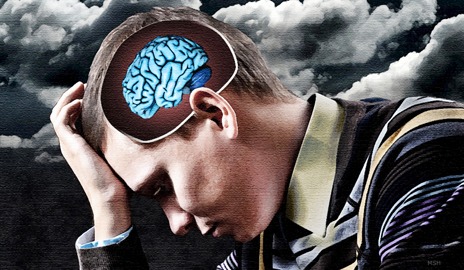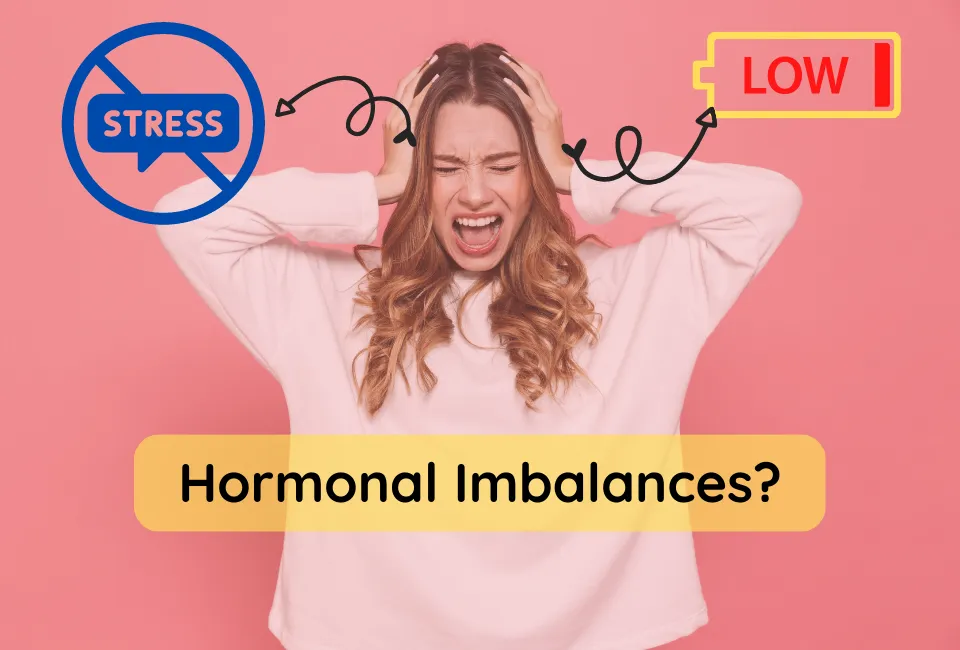What is depression, how do hormones affect it, and how to cope and overcome it in your life
Prof. Aécio D’Silva, Ph.D
AquaUniversity
Depression is a common but serious mental disorder that affects millions of people worldwide. It can cause persistent feelings of sadness, hopelessness, and loss of interest in activities that you once enjoyed. It can also affect your physical health, your relationships, and your ability to function at work or school. But depression is not a sign of weakness or a character flaw. It is a treatable condition that can be managed and overcome with faith in God’s help and the right support.
In this Intelligent Collaborative Knowledge post, we will explore what depression is, how hormones play a role in it, and how to cope and overcome it in your life. We will also share some resources and tips to help you or someone you know who is struggling with depression.
What is depression?
Depression is a mood disorder that affects how you feel, think, and behave. It is not just feeling sad or blue for a few days. It is a persistent and pervasive state of low mood that lasts for at least two weeks and interferes with your daily functioning and quality of life.
Depression can have different causes, such as genetic, biological, psychological, or environmental factors. It can also be triggered by stressful or traumatic events, such as loss, abuse, illness, or conflict. Depression can affect anyone, regardless of age, gender, race, or background. However, some people may be more vulnerable or prone to depression than others, due to their personality, temperament, or life circumstances.
Depression can have different symptoms, depending on the severity, type, and duration of the disorder. Some of the common signs and symptoms of depression are:
- Feeling sad, empty, or hopeless most of the time
- Losing interest or pleasure in activities that you used to enjoy
- Having trouble sleeping, or sleeping too much
- Feeling tired, sluggish, or restless
- Having changes in your appetite or weight
- Feeling guilty, worthless, or helpless
- Having difficulty concentrating, remembering, or making decisions
- Having thoughts of death or suicide, or attempting suicide
Depression can also cause physical symptoms, such as headaches, backaches, stomachaches, or other pains that do not have a clear medical cause. Depression can also affect your immune system, making you more susceptible to infections and illnesses.
Depression can be classified into different types, depending on the nature and frequency of the symptoms. Some of the common types of depression are:
- Major depressive disorder: This is the most common and severe form of depression, characterized by having five or more of the symptoms listed above for at least two weeks.
- Persistent depressive disorder: This is a chronic form of depression, characterized by having two or more of the symptoms listed above for at least two years.
- Bipolar disorder: This is a mood disorder that involves alternating episodes of depression and mania, which is a state of elevated mood, energy, and activity.
- Seasonal affective disorder: This is a type of depression that occurs during the winter months, when there is less sunlight and more darkness.
- Postpartum depression: This is a type of depression that affects some women after giving birth, due to hormonal changes, physical stress, and emotional adjustments.
- Premenstrual dysphoric disorder: This is a type of depression that affects some women before their menstrual periods, due to hormonal fluctuations, mood swings, and physical symptoms.
Depression is a serious condition that can have negative consequences for your health, your relationships, and your life. If you think you or someone you know may have depression, it is important to seek professional help as soon as possible. Depression can be diagnosed by a qualified mental health professional, such as a psychiatrist, psychologist, or counselor, who can assess your symptoms, history, and situation, and provide you with a proper diagnosis and treatment plan. Counseling or support groups at your church can greatly help you overcome this lack of mental clarity.
How hormones affect depression
Hormones are chemical messengers that regulate various functions and processes in your body, such as growth, metabolism, reproduction, and mood. Hormones are produced by various glands and organs in your body, such as the thyroid, the adrenal, the ovaries, and the testes. Hormones travel through your bloodstream and bind to specific receptors in your cells, tissues, and organs, and influence their activity and behavior.
Hormones play a significant role in your mood and emotions, as they affect the levels and functions of neurotransmitters, which are chemical substances that transmit signals between the nerve cells in your brain and nervous system. Neurotransmitters are responsible for regulating your mood, cognition, motivation, and behavior. Some of the key neurotransmitters involved in depression are serotonin, dopamine, norepinephrine, and gamma-aminobutyric acid (GABA).
Serotonin is a neurotransmitter that is associated with feelings of happiness, well-being, and satisfaction. Serotonin helps regulate your mood, appetite, sleep, memory, and learning. Low levels of serotonin can cause depression, anxiety, irritability, and aggression.
Dopamine is a neurotransmitter that is associated with feelings of pleasure, reward, and motivation. Dopamine helps regulate your movement, attention, learning, and decision-making. Low levels of dopamine can cause depression, apathy, fatigue, and lack of interest.
Norepinephrine is a neurotransmitter that is associated with feelings of alertness, arousal, and energy. Norepinephrine helps regulate your heart rate, blood pressure, breathing, and stress response. Low levels of norepinephrine can cause depression, lethargy, and low mood.
GABA is a neurotransmitter that is associated with feelings of calmness, relaxation, and inhibition. GABA helps regulate your anxiety, fear, and pain perception. Low levels of GABA can cause depression, anxiety, insomnia, and restlessness.
Hormones can affect the levels and functions of these neurotransmitters, and thus influence your mood and emotions. For example, estrogen and progesterone are female sex hormones that are produced by the ovaries and regulate the menstrual cycle, pregnancy, and menopause. Estrogen and progesterone can affect the levels and functions of serotonin, dopamine, norepinephrine, and GABA, and thus influence your mood and emotions. For example, estrogen can increase the levels and functions of serotonin, dopamine, and norepinephrine, and thus enhance your mood and well-being. Progesterone can increase the levels and functions of GABA, and thus reduce your anxiety and stress. However, fluctuations in estrogen and progesterone levels, such as during the menstrual cycle, pregnancy, or menopause, can cause changes in your mood and emotions, and increase your risk of depression.
Testosterone is a male sex hormone that is produced by the testes and regulates the development and maintenance of male characteristics, such as muscle mass, body hair, and voice. Testosterone can also affect the levels and functions of serotonin, dopamine, norepinephrine, and GABA, and thus influence your mood and emotions. For example, testosterone can increase the levels and functions of dopamine and norepinephrine, and thus enhance your motivation and energy. However, low levels of testosterone, such as due to aging, illness, or medication, can cause depression, fatigue, and low libido.
Cortisol is a stress hormone that is produced by the adrenal glands and regulates your response to stress, danger, and threat. Cortisol can also affect the levels and functions of serotonin, dopamine, norepinephrine, and GABA, and thus influence your mood and emotions. For example, cortisol can decrease the levels and functions of serotonin, dopamine, and GABA, and thus impair your mood and well-being. However, high levels of cortisol, such as due to chronic stress, trauma, or abuse, can cause depression, anxiety, insomnia, and memory loss.
Thyroid hormones are hormones that are produced by the thyroid gland and regulate your metabolism, growth, and development. Thyroid hormones can also affect the levels and functions of serotonin, dopamine, norepinephrine, and GABA, and thus influence your mood and emotions. For example, thyroid hormones can increase the levels and functions of serotonin, dopamine, and norepinephrine, and thus enhance your mood and cognition. However, imbalances in thyroid hormones, such as due to hyperthyroidism or hypothyroidism, can cause depression, anxiety, irritability, and mood swings.
As you can see, hormones can have a significant impact on your mood and emotions, and thus on your risk and experience of depression. Hormones can also interact with each other, and with other factors, such as genetics, environment, and lifestyle, and create a complex and dynamic system that influences your mental health. Therefore, it is important to monitor and manage your hormonal levels and functions and to seek counseling and professional help if you suspect or experience any hormonal imbalances or disorders.
How to cope and overcome depression in your life
Depression is a treatable condition that can be managed and overcome with the right help and support. Various options and strategies can help you cope and overcome depression in your life, such as:
- Psychotherapy: Psychotherapy is a form of counseling that involves talking to a trained mental health professional, such as a psychiatrist, psychologist, or counselor, who can help you understand and deal with your depression. Psychotherapy can help you identify and change your negative thoughts, feelings, and behaviors, and develop more positive and adaptive ones. Psychotherapy can also help you cope with your stress, trauma, or loss, and improve your self-esteem, confidence, and relationships. There are different types and approaches of psychotherapy, such as cognitive-behavioral therapy (CBT), interpersonal therapy (IPT), or psychodynamic therapy, that can suit your needs and preferences.
- Medication: Medication is a form of treatment that involves taking prescribed drugs, such as antidepressants, that can help balance your brain chemistry and improve your mood. Medication can be effective for some people with depression, especially those with moderate to severe symptoms, or those who do not respond well to psychotherapy alone. Medication can also help reduce the risk of relapse or recurrence of depression. However, medication is not a cure for depression, and it does not address the underlying causes or factors of the disorder. Medication can also have side effects, such as nausea, weight gain, sexual dysfunction, or insomnia, that can affect your physical health and well-being. Therefore, medication should be used under the supervision and guidance of a qualified medical professional, such as a psychiatrist, who can monitor your progress, adjust your dosage, and manage your side effects. Medication should also be combined with other forms of treatment, such as psychotherapy, lifestyle changes, self-help techniques, and social support, to achieve the best results and outcomes.
Meditative Breathing – In our fast-paced world, where stress and a sedentary lifestyle have become the norm, it is essential to prioritize our health and well-being. While there are countless strategies to cope with depression and improve our overall well-being, three fundamental practices stand out for their notable benefits: meditative breathing, adequate hydration, and daily exposure to sunlight. By adopting this triad, we can achieve significant transformations in our physical, mental, and emotional health. You can access valuable and practical information about these practices by visiting the following link on this website.
In conclusion, Depression is a common but serious mental disorder that affects millions of people worldwide. It can cause persistent feelings of sadness, hopelessness, and loss of interest in activities that you once enjoyed. It can also affect your physical health, your relationships, and your ability to function at work or school. But depression is not a sign of weakness or a character flaw. It is a treatable condition that can be managed and overcome with the right help and support.
Hormones are chemical messengers that regulate various functions and processes in your body, such as growth, metabolism, reproduction, and mood. Hormones can affect the levels and functions of neurotransmitters, which are chemical substances that transmit signals between the nerve cells in your brain and nervous system. Neurotransmitters are responsible for regulating your mood, cognition, motivation, and behavior. Hormones can have a significant impact on your mood and emotions, and thus on your risk and experience of depression. Hormones can also interact with each other, and with other factors, such as genetics, environment, and lifestyle, and create a complex and dynamic system that influences your mental health. Therefore, it is important to monitor and manage your hormonal levels and functions and to seek counseling and professional help if you suspect or experience any hormonal imbalances or disorders.
Various options and strategies can help you cope and overcome depression in your life, such as psychotherapy, medication, lifestyle changes, self-help techniques like meditative respiration, and social support. Psychotherapy is a form of counseling that involves talking to a trained mental health professional, who can help you understand and deal with your depression. Medication is a form of treatment that involves taking prescribed drugs, such as antidepressants, that can help balance your brain chemistry and improve your mood. Lifestyle changes are modifications that you can make in your daily habits, such as eating healthy, exercising regularly, sleeping well, and avoiding alcohol and drugs, that can help boost your physical and mental health. Self-help techniques are methods that you can use by yourself, such as meditation respiration, relaxation, journaling, and positive affirmations, that can help reduce your stress, anxiety, and negative thoughts. Spiritual support is the assistance and encouragement that you can get from your family, church, friends, support groups, or other people who care about you, which can help you cope with your depression and feel less alone.
Depression is a dark and difficult condition, but it is not a hopeless one. With the right help and support, you can overcome depression and reclaim your happiness and meaning in life. Remember, you are not alone, God is always on your side and you are not to blame. You are worthy of love, respect, and care. You are stronger than you think, and you can get through this. You have a bright and beautiful future ahead of you, and you deserve to live it.
References:
- The hormonal keys to depression – Naturehttps://www.nature.com/articles/d41586-022-02208-7
- Hormonal imbalance and depression: What to know – Medical News Todayhttps://www.medicalnewstoday.com/articles/hormonal-depression
- Hormones and Depression: The Correlation — Talkspacehttps://www.talkspace.com/mental-health/conditions/articles/hormonal-depression/
- Depression (major depressive disorder) – Symptoms and causes – Mayo Clinichttps://www.mayoclinic.org/diseases-conditions/depression/symptoms-causes/syc-20356007






